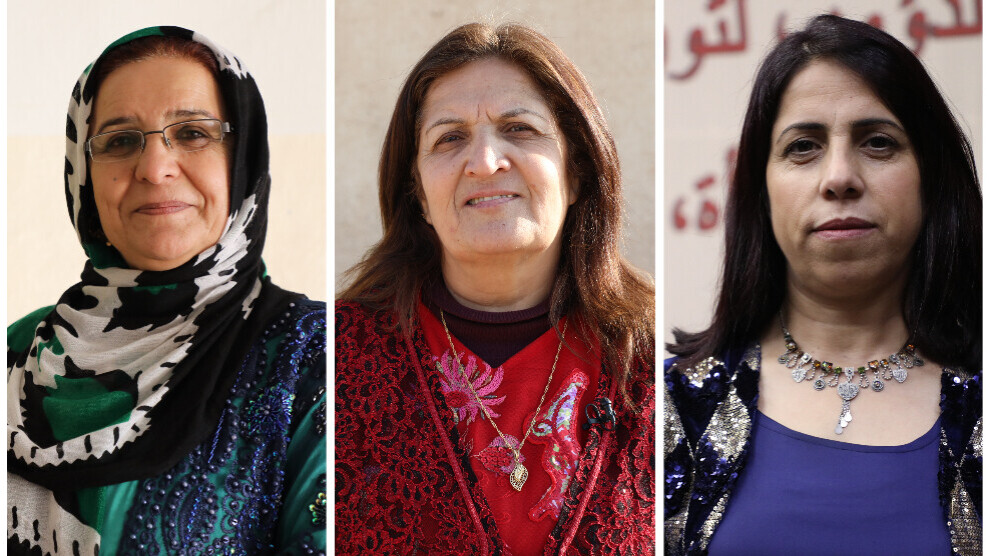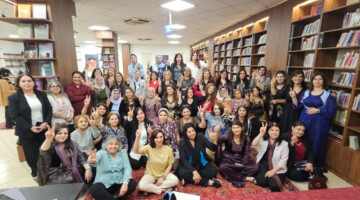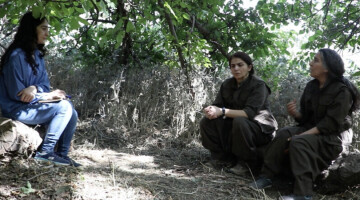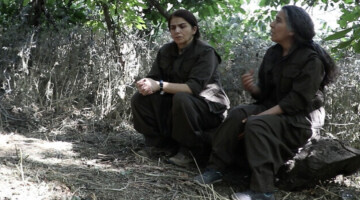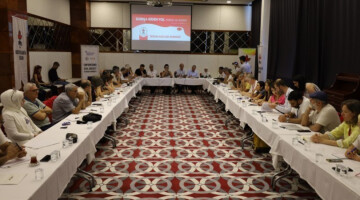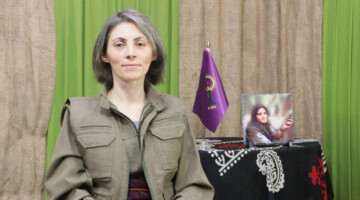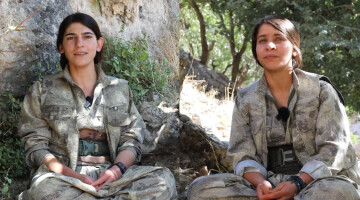After the introduction of the free woman paradigm of Kurdish leader Abdullah Öcalan and the Kurdistan Women's Freedom Movement's activities in Rojava, people of the region decided to organize their own unique organization. Women, mothers and activists within the women's liberation struggle started to discuss the structure, name and the form of organization. These discussions were concluded on January 15, 2005, and the Rojava women's struggle continued with the establishment of a new organization called Yekîtiya Star.
Kongra Star Spokeswoman Remziye Mihemed, who took part in the establishment of Yekîtiya Star, Aîfe Bekîr, Member of the Foreign Relations Department of the PYD (Democratic Union Party) General Assembly, Felek Yusif, Kobanê Canton Intellectuals Association Co-Chair and Şaha Xelîl, Qamishlo Canton Kongra Star Spokeswoman, talked to ANF about the establishment process and the initial activities.
A GROUP OF REVOLUTIONARY WOMEN AND MOTHERS
Remziye Mihemed, who took part in the establishment of Yekîtiya Star, gave an outline of the process: “Yekîtiya Star was founded on January 15, 2005, by a group of revolutionaries and mothers. Those who carried out the women's struggle in Rojava were the main pillar of this organization. With the women's organization that we launched secretly, we were able to lay a strong foundation for Rojava Kurdistan and the women's revolution. The main foundation of Yekîtiya Star is the Kurdistan Women's Freedom Struggle. Those who fought in the mountains became models for the organization there.”
WOMEN’S ORGANIZATION EXISTED EVEN BEFORE YEKITIYA STAR
Arife Bekîr from Afrin is among those who contributed to the establishment of Yekîtiya Star. PYD General Assembly Foreign Relations Assembly member Bekir pointed out that they had started their activities in Afrin in the 1980s. She said: “Those were very difficult and good days. We were working with love and great enthusiasm. We were asking questions such as what the Kurdish question is, who we are, where we come from, why we are oppressed. In this respect, we worked together with the people in Afrin. Women's organisation existed even before Yekîtiya Star. We were improving our education and organization based on women's experiences. We continued our work for our freedom and independent Kurdistan with determination.”
AFRIN WAS IMPORTANT FOR ORGANIZATIONAL ACTIVITIES
Bekir continued: “In Afrin, which is known as a pro-women city, activities had a tremendous impact. After realizing the fact that women were not strong enough and organized there, a strong initiative was introduced. We were constantly asking ourselves why men were active in every field, while women were not. We were saying that there should be equality between men and women, and we were seeking our rights.”
OPPRESSION AND TORTURE DID NOT PREVENT WOMEN
“Before the establishment of Yekîtiya Star, we worked as a militia. Our job was to organize society and women. We were conducting our work clandestinely. In the past, it was considered shameful by society for a woman to work and visit families. It was not considered appropriate for women to go out and work in public. We were suppressed by family, society and the state. We were nevertheless carrying out our activities in public. In 2008, I was arrested by the state and put in prison. We were subjected to a serious crackdown and torture in prison. However, we did not change our decision and we remained committed to achieving our freedom. Thus, we did not abandon the struggle. We started with a group of women. In the beginning, there were only Kurdish women. Over the years, Arab and Syriac women also joined this organization,” Bekir stated.
WOMEN’S ORGANIZATION BROUGHT ABOUT HOPE AND ENLIGHTENMENT
Felek Yusif, who participated in the establishment phase in the Kobanê region, talked about the struggle and her involvement as follows: “After I got married in 1993, I familiarized myself with the women's struggle. I got to know myself through the impact of the organization on women and society. It brought about hope and enlightenment for us. Even before Yekîtiya Star was founded, women were carrying out a struggle here. However, it was not institutional because of the Baath regime. We were carrying out the struggle as militias. We were visiting homes, resolving family problems. We were in constant communication with women. We received training in secret. There were many obstacles while carrying out our activities. Both the state crackdown and tribalism were challenges to our organizational activities.”
WOMEN SURPASSED THE STATE AND TRIBALISM
Yusif continued: “There were activities everywhere and they were carried out in secret. Especially in Ain Issa, the Kurdish families involved in organizational activities were in the public eye since the majority of the population was Arab. So, they were gathering clandestinely. What made Kobanê different from other regions? It was just us, the Kurds, involved in the work there. The activists there supported and covered each other, but those working in other areas were reported to the government and had their homes raided by the state forces. The biggest challenge to carrying out activities in Kobanê was imprisonment. Customs and manners in Kobanê regarded the imprisonment of women as indecent. The government knew this well, so it couldn't suppress women much. However, the state forces increased pressure after realizing that women were advancing gradually. By improving their organization, women could also surpass the narrow traditions of the tribes.”
THANKS TO THE LEADER AND THE FREEDOM MOVEMENT
Shaha Xelîl from Qamishlo is one of those women who have been struggling since 1986-1987. Xelîl said: “We rely on the line of women's freedom against the patriarchal mentality that has supressed us for centuries. Because of this mentality, we were deprived of all our rights. We are still fighting against it. This is thanks to the Freedom Movement and Öcalan's philosophy. Women began to search for their genuine self after Öcalan began to promote women's freedom and rights. The most important contribution in North-East Syria was made by the Freedom Movement fighters. In the 1980s, 1990s and afterwards, the women fighters of the Freedom Movement were active all over Syria. It was the first attempt for the Kurdish women to organize themselves in every field. It was a very difficult process for us. Society was petrified because of the pressure of both the Baath regime and the traditions and customs of the patriarchal mentality. Women were involved in political and military activities for the first time. Thanks to the Freedom Movement militants, more women joined the women's movement to expand the organization and the freedom struggle.
THE WORK WENT BEYOND KURDISH REGIONS
While activities had been carried out mostly in the Kurdish regions before, Yekîtiya Star carried out work to reach all components and gather them under a single roof. Now, activities have spread across Rojava and all of Syria. When Yekîtiya Star was founded, our numbers were very small. Work was underway throughout the Cizîre region through mothers such as Esma, Comrade Remziye, Mother Hogir and Comrade Hanife. When necessary, we were active in the committees of economy, justice and defence as well. We did all the work together. We were making family visits and organizing participation. The pressure of the Baath regime was also very intense. Mother Esma, Mother Hogir and many other women activists were jailed. It wasn't easy at all. Both the state forces and the customs of society were challenging. Nevertheless, as Yekîtiya Star, we insisted on our work and struggle. We have come to these days thanks to this persistence.”

